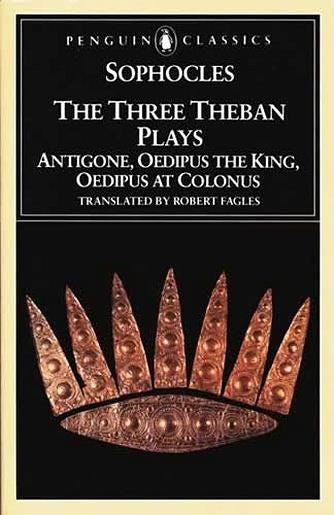Many years ago, as a teenager, I read all of the surviving Greek Tragedy in a one-volume Spanish translation. More recently, I’ve been buying the bilingual Loeb editions and gone through some of them (all Aeschylus, for example). In this case, I choose the 1984 translation by Robert Fagles because I had it in digital form, it included the three Theban Plays (Antigone, Oedipus the King and Oedipus in Colonus) that were being read and commented in the podcast Ascend, the Great Books which I follow, and because it was the translation they were recommending.
These plays arguably constitute the heart of Greek Classical Tragedy (Aristotle rate Oedipus the King as the acme of the whole art form). A review that deals with their plot or stylistic significance feels unnecessary: these are classics that have been read for hundreds of years and all the information about them is easily accessible at the tip of your fingertips. So in these brief lines, I’ll just comment briefly on some of the characteristics of the present edition and on the significance of Sophoclean tragedy today.
This edition comes with a very good introduction by Bernard Knox. In it, he situates Sophocles’ tragedies within the rich cultural and political context of 5th-century BCE Athens, a democracy at its intellectual peak yet plagued by war and civic unrest. He emphasizes that while these plays draw on mythic material, they reflect urgent contemporary concerns, particularly the tension between individual conscience and state authority, human agency and divine will. Antigone dramatizes the clash between familial and civic duty, while Oedipus the King explores the devastating pursuit of self-knowledge and the limits of human understanding. Knox also highlights Sophocles’ use of dramatic irony, compact structure, and the chorus’s role as a bridge between actors and audience, all of which deepen the emotional and philosophical impact of the plays.
Knox argues that although the three Theban plays are often read in mythological order, their actual order of composition -Antigone, Oedipus the King, Oedipus at Colonus- traces Sophocles’ evolving tragic vision. He also cautions against reading them as a unified trilogy, noting the shifting portrayal of recurring characters like Creon. The introduction closes with reflections on the plays' enduring power, especially in light of 20th-century political tyranny and resistance. Knox sees in Sophocles’ tragic heroes a timeless moral seriousness and unwavering integrity that resonate with audiences across ages, making these ancient works profoundly relevant to modern readers and theatergoers alike.
The text has some illustration throughout, which are mostly pieces of Mycenaic art (seals, pottery, jewellery) which approximate the time-period in which these mythical stories would have taken place. As for the language of the translation, Fagles reads really well: he’s very readable and modern, very fluid, and has a good mastery of language and lyricism which probably honor the original Greek. It is difficult to make a translation of a classic and make it feel like literature, but I feel the author has done a decent job here. The book also comes with quite a lot of notes (by Knox) which I didn’t consult, but which will be helpful for a lay reader that is not too immersed in Greek legend, art and customs.
All in all, this edition is an excellent entry point into Sophocles for both first-time readers and those revisiting the plays with more context. The translation, as mentioned, is both accessible and literate, the supplementary material is thoughtful and informative, and the thematic depth of the plays remains undiminished by time (at least if you’re a person like me who remains under the spell of the classics and the idea of the ‘Great Conversation’ with the masterworks and minds of the past). For me, whether read as political allegory, psychological exploration, or timeless meditation on human limits and responsibilities, these tragedies still speak with force. For anyone interested in understanding the roots of Western drama, or the perennial questions of fate, freedom, and moral duty, this is a volume well worth reading.




